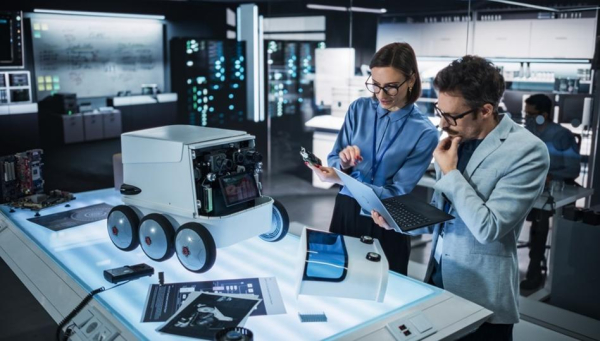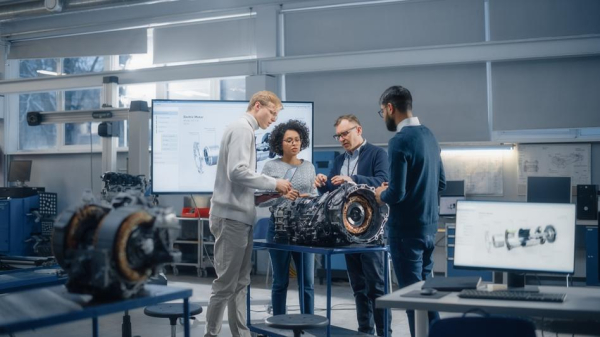More and more entrepreneurs who are thinking about developing their companies are using the help of a solid expert base, laboratories or network of contacts. However, institutions created to help – technology parks, clusters or technology transfer centers themselves need a financial injection. Without modern infrastructure, specialized staff and funds for modernization, the offer they propose gradually loses its attractiveness and does not affect the competitiveness and innovation of enterprises. The solution is the offer of financial support for cluster coordinators under the European Funds for Modern Economy program.

The enigmatic acronym IOB
Business Environment Institutions (BSIs) are non-commercial or non-profit entities. Their goal is to support the development of entrepreneurship and innovation by providing services to companies. These are institutions that facilitate the functioning of entrepreneurs, supporting them in establishing business contacts, technological development, obtaining financing or technology transfer. They offer enterprises real support in specific areas such as innovation, internationalization of activities, promotion of digitization and green transformation or creation of cooperation ecosystems. BSIs operate in various organizational and legal forms, through associations and foundations, to business incubators, universities, research and development units or chambers of commerce. Thanks to the adopted business model, BSIs ensure the so-called multiplier effect: one strong BSI brings dozens of competitive enterprises with it.
We encourage you to read the study on IOB, which presents their definition, characteristics and functioning: https://www.parp.gov.pl/publications/publication/instytucje-otoczenia-biznesu
Clusters: A Recipe for Crisis
Business Environment Institutions also include clusters. Clusters are groups of companies located in a given region, consisting of specialized suppliers, scientific units, which are interconnected. These units cooperate with each other and compete at the same time, which contributes to increasing the innovativeness of the region. The development of these institutions is one of the main priorities of the EU’s industrial policy. Their phenomenon is that they combine business, science and public institutions, thus creating economies of scale that individual companies would not be able to achieve. There are already over 1,500 clusters in the European Union located in over 200 regions, which generate almost 25% of total employment. Companies associated in clusters are additionally distinguished by a higher number of patents and trademarks than other companies.
Clusters are becoming more and more common in Poland, although still not widely discussed. One of the first institutions to get involved in popularizing the idea of clustering in Poland was the Polish Agency for Enterprise Development (PARP). Clusters in Poland are a perspective of the last twenty years. The topic is relatively new and unknown to a wider group of potential recipients. Therefore, few companies are yet to reap the benefits that flow from the support of these institutions.

Not only abroad
In Poland, two basic categories of clusters have been formed so far. The first one, the National Key Cluster, is a status granted by the Ministry of Development and Technology. It can be obtained by clusters that are distinguished by their supra-regional scope of activity, high development potential, innovation or ability to internationalize. The second category, the Supra-Regional Growth Cluster, is an advanced form of cluster that has not yet obtained the status of the National Key Cluster, but is expanded and organized. The Supra-Regional Growth Cluster covers at least two voivodeships and brings together several dozen entities, which are most often enterprises, scientific and research units and business environment institutions.
European Commission statistics clearly indicate that where clusters operate actively, innovation, export and employment grow, and regions adopt green and digital technologies faster. The introduction of modern solutions in clusters will enable real, beneficial changes in Polish companies. Investing in institutions supporting entrepreneurs is a huge opportunity to strengthen micro, small and medium-sized enterprises, both locally and nationally by increasing their competitiveness.
Recruitment continues!
June 2025 is the month when applications for the “Development of cluster offer for companies” competition will begin in the European Funds for Modern Economy program. Financial support is intended for coordinators of National Key Clusters and Supraregional Growth Clusters. For the former, the application process will start on June 3 and will last until August 4, 2025. It will cover a budget of PLN 50 million. As part of the competition, clusters that qualify for it will be able to receive funding of up to 70% of the project value. This is a huge opportunity to undertake a number of activities that would be difficult to implement without support of this rank. Supraregional Growth Clusters will also be able to receive funding of up to 70% of the project value. The budget of the competition planned for them is PLN 25 million. Coordinators of Supraregional Clusters can submit applications from June 10 to August 11 of this year. In both competitions, financial resources can be received by projects that take into account the development of the service offer for companies in the area of education or digital and ecological transformation.

The European Funds for Modern Economy program clearly focuses on those who drive the development of companies on a daily basis: Business Environment Institutions and cluster coordinators. The latest competition allows for co-financing the modernization of laboratories, the digitization of processes and the internationalization of activities. Thanks to EU funds, the idea of “support for supporters” is strengthened – investing in the facilities that help companies implement innovations, export and accelerate the green and digital transformation. Stronger and developed clusters translate directly into easier access for companies to knowledge and financing, creating a beneficial domino effect for the national economy.
